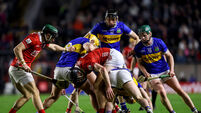Leaflets call for 'day of resistance' in Baghdad
Leaflets distributed in Baghdad called for a "Day of Resistance" today at the start of a three-day general strike to protest the US occupation of the city a day after fresh anti-American violence left two Iraqis dead.
US troops battled Iraqi rioters when a dispute over a marketplace just outside the Iraqi capital exploded into fury yesterday. Two Iraqis were killed, and 19 others, including two US soldiers, were reported wounded as rioters waved portraits of Saddam Hussein.














